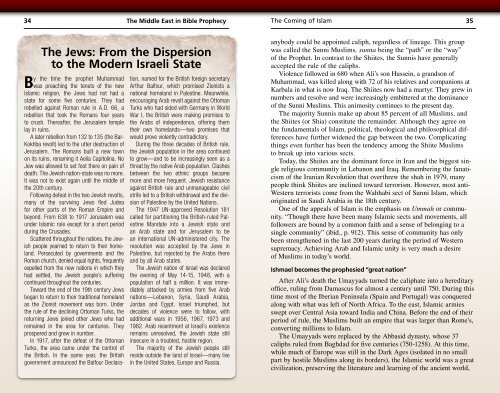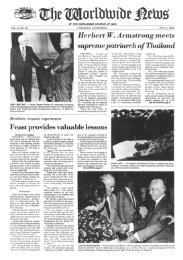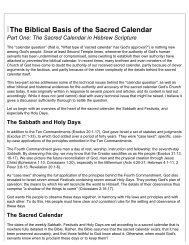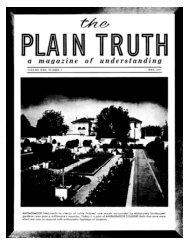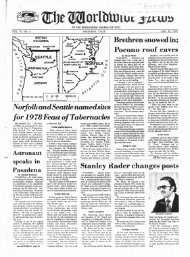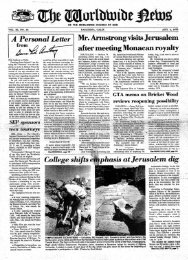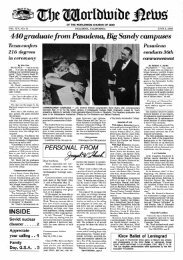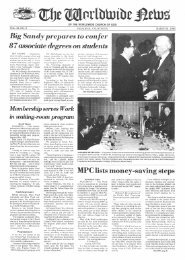The Middle East in Bible Prophecy - United Church of God
The Middle East in Bible Prophecy - United Church of God
The Middle East in Bible Prophecy - United Church of God
Create successful ePaper yourself
Turn your PDF publications into a flip-book with our unique Google optimized e-Paper software.
34 <strong>The</strong> <strong>Middle</strong> <strong>East</strong> <strong>in</strong> <strong>Bible</strong> <strong>Prophecy</strong> <strong>The</strong> Com<strong>in</strong>g <strong>of</strong> Islam<br />
35<br />
<strong>The</strong> Jews: From the Dispersion<br />
to the Modern Israeli State<br />
By the time the prophet Muhammad<br />
was preach<strong>in</strong>g the tenets <strong>of</strong> the new<br />
Islamic religion, the Jews had not had a<br />
state for some five centuries. <strong>The</strong>y had<br />
rebelled aga<strong>in</strong>st Roman rule <strong>in</strong> A.D. 66, a<br />
rebellion that took the Romans four years<br />
to crush. <strong>The</strong>reafter, the Jerusalem temple<br />
lay <strong>in</strong> ru<strong>in</strong>s.<br />
A later rebellion from 132 to 135 (the Bar-<br />
Kokhba revolt) led to the utter destruction <strong>of</strong><br />
Jerusalem. <strong>The</strong> Romans built a new town<br />
on its ru<strong>in</strong>s, renam<strong>in</strong>g it Aelia Capitol<strong>in</strong>a. No<br />
Jew was allowed to set foot there on pa<strong>in</strong> <strong>of</strong><br />
death. <strong>The</strong> Jewish nation-state was no more.<br />
It was not to exist aga<strong>in</strong> until the middle <strong>of</strong><br />
the 20th century.<br />
Follow<strong>in</strong>g defeat <strong>in</strong> the two Jewish revolts,<br />
many <strong>of</strong> the surviv<strong>in</strong>g Jews fled Judea<br />
for other parts <strong>of</strong> the Roman Empire and<br />
beyond. From 638 to 1917 Jerusalem was<br />
under Islamic rule except for a short period<br />
dur<strong>in</strong>g the Crusades.<br />
Scattered throughout the nations, the Jewish<br />
people yearned to return to their homeland.<br />
Persecuted by governments and the<br />
Roman church, denied equal rights, frequently<br />
expelled from the new nations <strong>in</strong> which they<br />
had settled, the Jewish people’s suffer<strong>in</strong>g<br />
cont<strong>in</strong>ued throughout the centuries.<br />
Toward the end <strong>of</strong> the 19th century Jews<br />
began to return to their traditional homeland<br />
as the Zionist movement was born. Under<br />
the rule <strong>of</strong> the decl<strong>in</strong><strong>in</strong>g Ottoman Turks, the<br />
return<strong>in</strong>g Jews jo<strong>in</strong>ed other Jews who had<br />
rema<strong>in</strong>ed <strong>in</strong> the area for centuries. <strong>The</strong>y<br />
prospered and grew <strong>in</strong> number.<br />
In 1917, after the defeat <strong>of</strong> the Ottoman<br />
Turks, the area came under the control <strong>of</strong><br />
the British. In the same year, the British<br />
government announced the Balfour Declaration,<br />
named for the British foreign secretary<br />
Arthur Balfour, which promised Zionists a<br />
national homeland <strong>in</strong> Palest<strong>in</strong>e. Meanwhile,<br />
encourag<strong>in</strong>g Arab revolt aga<strong>in</strong>st the Ottoman<br />
Turks who had sided with Germany <strong>in</strong> World<br />
War I, the British were mak<strong>in</strong>g promises to<br />
the Arabs <strong>of</strong> <strong>in</strong>dependence, <strong>of</strong>fer<strong>in</strong>g them<br />
their own homelands—two promises that<br />
would prove violently contradictory.<br />
Dur<strong>in</strong>g the three decades <strong>of</strong> British rule,<br />
the Jewish population <strong>in</strong> the area cont<strong>in</strong>ued<br />
to grow—and to be <strong>in</strong>creas<strong>in</strong>gly seen as a<br />
threat by the native Arab population. Clashes<br />
between the two ethnic groups became<br />
more and more frequent. Jewish resistance<br />
aga<strong>in</strong>st British rule and unmanageable civil<br />
strife led to a British withdrawal and the division<br />
<strong>of</strong> Palest<strong>in</strong>e by the <strong>United</strong> Nations.<br />
<strong>The</strong> 1947 UN-approved Resolution 181<br />
called for partition<strong>in</strong>g the British-ruled Palest<strong>in</strong>e<br />
Mandate <strong>in</strong>to a Jewish state and<br />
an Arab state and for Jerusalem to be<br />
an <strong>in</strong>ternational UN-adm<strong>in</strong>istered city. <strong>The</strong><br />
resolution was accepted by the Jews <strong>in</strong><br />
Palest<strong>in</strong>e, but rejected by the Arabs there<br />
and by all Arab states.<br />
<strong>The</strong> Jewish nation <strong>of</strong> Israel was declared<br />
the even<strong>in</strong>g <strong>of</strong> May 14-15, 1948, with a<br />
population <strong>of</strong> half a million. It was immediately<br />
attacked by armies from five Arab<br />
nations—Lebanon, Syria, Saudi Arabia,<br />
Jordan and Egypt. Israel triumphed, but<br />
decades <strong>of</strong> violence were to follow, with<br />
additional wars <strong>in</strong> 1956, 1967, 1973 and<br />
1982. Arab resentment at Israel’s existence<br />
rema<strong>in</strong>s unresolved, the Jewish state still<br />
<strong>in</strong>secure <strong>in</strong> a troubled, hostile region.<br />
<strong>The</strong> majority <strong>of</strong> the Jewish people still<br />
reside outside the land <strong>of</strong> Israel—many live<br />
<strong>in</strong> the <strong>United</strong> States, Europe and Russia.<br />
anybody could be appo<strong>in</strong>ted caliph, regardless <strong>of</strong> l<strong>in</strong>eage. This group<br />
was called the Sunni Muslims, sunna be<strong>in</strong>g the “path” or the “way”<br />
<strong>of</strong> the Prophet. In contrast to the Shiites, the Sunnis have generally<br />
accepted the rule <strong>of</strong> the caliphs.<br />
Violence followed <strong>in</strong> 680 when Ali’s son Husse<strong>in</strong>, a grandson <strong>of</strong><br />
Muhammad, was killed along with 72 <strong>of</strong> his relatives and companions at<br />
Karbala <strong>in</strong> what is now Iraq. <strong>The</strong> Shiites now had a martyr. <strong>The</strong>y grew <strong>in</strong><br />
numbers and resolve and were <strong>in</strong>creas<strong>in</strong>gly embittered at the dom<strong>in</strong>ance<br />
<strong>of</strong> the Sunni Muslims. This animosity cont<strong>in</strong>ues to the present day.<br />
<strong>The</strong> majority Sunnis make up about 85 percent <strong>of</strong> all Muslims, and<br />
the Shiites (or Shia) constitute the rema<strong>in</strong>der. Although they agree on<br />
the fundamentals <strong>of</strong> Islam, political, theological and philosophical differences<br />
have further widened the gap between the two. Complicat<strong>in</strong>g<br />
th<strong>in</strong>gs even further has been the tendency among the Shiite Muslims<br />
to break up <strong>in</strong>to various sects.<br />
Today, the Shiites are the dom<strong>in</strong>ant force <strong>in</strong> Iran and the biggest s<strong>in</strong>gle<br />
religious community <strong>in</strong> Lebanon and Iraq. Remember<strong>in</strong>g the fanaticism<br />
<strong>of</strong> the Iranian Revolution that overthrew the shah <strong>in</strong> 1979, many<br />
people th<strong>in</strong>k Shiites are <strong>in</strong>cl<strong>in</strong>ed toward terrorism. However, most anti-<br />
Western terrorists come from the Wahhabi sect <strong>of</strong> Sunni Islam, which<br />
orig<strong>in</strong>ated <strong>in</strong> Saudi Arabia <strong>in</strong> the 18th century.<br />
One <strong>of</strong> the appeals <strong>of</strong> Islam is the emphasis on Ummah or community.<br />
“Though there have been many Islamic sects and movements, all<br />
followers are bound by a common faith and a sense <strong>of</strong> belong<strong>in</strong>g to a<br />
s<strong>in</strong>gle community” (ibid., p. 912). This sense <strong>of</strong> community has only<br />
been strengthened <strong>in</strong> the last 200 years dur<strong>in</strong>g the period <strong>of</strong> Western<br />
supremacy. Achiev<strong>in</strong>g Arab and Islamic unity is very much a desire<br />
<strong>of</strong> Muslims <strong>in</strong> today’s world.<br />
Ishmael becomes the prophesied “great nation”<br />
After Ali’s death the Umayyads turned the caliphate <strong>in</strong>to a hereditary<br />
<strong>of</strong>fice, rul<strong>in</strong>g from Damascus for almost a century until 750. Dur<strong>in</strong>g this<br />
time most <strong>of</strong> the Iberian Pen<strong>in</strong>sula (Spa<strong>in</strong> and Portugal) was conquered<br />
along with what was left <strong>of</strong> North Africa. To the east, Islamic armies<br />
swept over Central Asia toward India and Ch<strong>in</strong>a. Before the end <strong>of</strong> their<br />
period <strong>of</strong> rule, the Muslims built an empire that was larger than Rome’s,<br />
convert<strong>in</strong>g millions to Islam.<br />
<strong>The</strong> Umayyads were replaced by the Abbasid dynasty, whose 37<br />
caliphs ruled from Baghdad for five centuries (750-1258). At this time,<br />
while much <strong>of</strong> Europe was still <strong>in</strong> the Dark Ages (isolated <strong>in</strong> no small<br />
part by hostile Muslims along its borders), the Islamic world was a great<br />
civilization, preserv<strong>in</strong>g the literature and learn<strong>in</strong>g <strong>of</strong> the ancient world,


